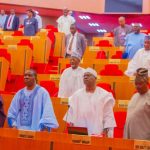Nigeria must prioritise the development of its energy sector for it to tap into the opportunity of the $50 billion pledged by African leaders to accelerate energy access and economic growth in the continent, an energy analyst, Celestine Umadi, has said.
In an interview with New Telegraph over the weekend, he stated that this entailed investing in renewable energy sources, such as solar and wind power, to reduce the country’s reliance on fossil fuels.
He added that by doing so, Nigeria could decrease its carbon footprint, mitigate the impacts of climate change, and create a more sustainable energy mix.
A statement by the African Development Bank explained that 30 African Heads of State and government had committed to concrete reforms and actions to expand access to reliable, affordable, and sustainable electricity to power economic growth, improve quality of life, and drive job creation across the continent.
They pledged their commitment in a declaration during the recent two-day Mission 300 Africa Energy Summit in the Tanzanian commercial capital, Dar es Salaam.
It also explained that Mission 300 partners pledged more than $50 billion in support of increasing energy access across Africa.
The statement said: “The Dar es Salaam Energy Declaration represents a key milestone in addressing the energy gap in Africa, where more than 600 million people currently live without electricity.
The commitments in the Declaration are a critical piece of the Mission 300 initiative, which unites governments, development banks, partners, philanthropies, and the private sector to connect 300 million Africans to electricity by 2030.
The Declaration will now be submitted to the African Union Summit in February for adoption.” Umadi expressed the optimism that Nigeria’s energy landscape was poised for a transformative shift, courtesy of the recent commitments made by African leaders at the Mission 300 Africa Energy Summit in Dar es Salaam, Tanzania.
He noted that with over $50 billion pledged to accelerate energy access and economic growth, Nigeria would gain significantly from this initiative. He urged Nigeria to engage in key reforms and investments.
He stated that to achieve its energy goals, Nigeria should focus on some areas which include: Infrastructure development: He urged the government to invest in the development of energy infrastructure, including power plants, transmission lines, and distribution networks.
According to him, this will help to increase energy access, reduce power outages, and improve the overall efficiency of the energy sector. He also advocated investment in renewable energy, adding that the investment is necessary to promote the development and use of renewable energy sources, such as solar, wind, and hydro power.
The analyst also canvassed the implementation of energy-efficient practices and technologies to reduce energy consumption and waste. He added that this could be achieved through the development of energy-efficient buildings, the use of energy-efficient appliances, and the promotion of energy-saving behaviors.
For him, it is important to invest in the development of local capacity and expertise in the energy sector. He explained that this can be achieved through the provision of training and education programs, the development of local content policies, and the promotion of technology transfer and collaboration.
Umadi said: “By implementing these reforms and investments, Nigeria stands to gain significantly from the Mission 300 initiative.
Some of the benefits include: Increased energy access: Nigeria can increase energy access for its citizens, particularly in rural and under – served areas. This can help to improve healthcare, education, and economic outcomes.
“Economic Growth: The development of the energy sector can drive economic growth, create jobs, and stimulate local economies.
Another area is improved energy security. Nigeria can reduce its reliance on imported fossil fuels, improve its energy security, and reduce the impacts of price volatility.
“Environmental Benefits: The promotion of renewable energy and energy efficiency can help to reduce Nigeria’s carbon footprint, mitigate the impacts of climate change, and improve air and water quality.”
He, however, warned that despite the potential benefits, Nigeria’s energy sector faced several challenges, including: infrastructure constraints. Nigeria’s energy infrastructure is in need of upgrading and expansion to support increased energy demand.
He also said there were funding constraints, adding that the development of Nigeria’s energy sector required significant investment, which can be a challenge given the country’s limited financial resources.
He further called for policy and regulatory framework and advised that Nigeria’s energy sector was in need of a clear and consistent policy and regulatory framework to support the development of the sector.
“However, these challenges also present opportunities for Nigeria to develop its energy sector in a sustainable and inclusive manner.
By prioritising the development of renewable energy, energy efficiency, and infrastructure development, Nigeria can unlock its energy potential, reduce its reliance on fossil fuels, and create a more sustainable energy future.
“The Mission 300 initiative presents a unique opportunity for Nigeria to transform its energy sector, increase energy access, and drive economic growth.
By prioritizing the development of renewable energy, energy efficiency, and infrastructure development, Nigeria can unlock its energy potential, reduce its reliance on fossil fuels, and create a more sustainable energy future,” Umadi said.








